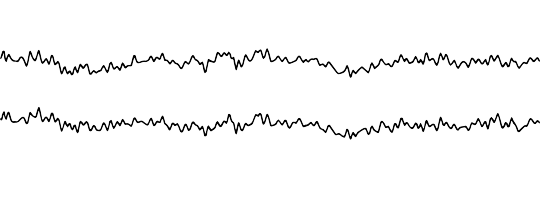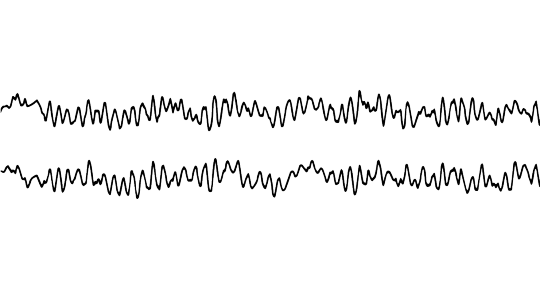Text
Know Who You Are At Every Age
Cocteau Twins / Four Calendar Café

If I, or anyone for that matter, claimed to have the right words to describe such a gripping and spellbinding work, those words would be nothing more than lies weaved together in an untidy, unruly knot. Words don’t necessarily fail us all the time — they only do when we expect them to be perfect carriers of meaning and clarity. What happens, then, when we try to unravel this knot, when we're put into a situation where we can no longer carry these expectations, and when we choose to look past them?
This week's post explores Cocteau Twins' "Know Who You Are At Every Age", the first track from their 1993 album Four Calendar Café, as a means of unravelling the knot, and to hopefully reveal the threads of an experience of hearing beneath it.
A quick Google search for the lyrics of "Know Who You Are At Every Age" doesn't yield much except for slight contradictions here and there. It's evidently clear that there hasn't been much of a consensus regarding the lyrics for this song. Let's take a look at the first few lines:
Genius writes —
“My senses are addicted to a discreet desire to
Observe such, feel such
Behave such, it makes this hard for me”
while Musixmatch’s rendition of it goes —
“It seems things are indictive to a distinct desire to
Observe such, heal such
Behave such that makes this hard for me”
Yet, if anything, the confusion between these two quoted lyrics, in particular, exposes an apparent desire to make sense of what we hear. Namely, that we're always trying to listen for meaning, rather than hearing the song as it is. This is to be expected — after all, our whole lives have always revolved around being able to understand the things that we listen to, largely for the sake of our own sanity. Think about all the times your first instinct upon hearing a song was to Google the lyrics to it, and then think about how much reading and processing those lyrics eventually affected how you viewed the song, be it in how you felt about it, or in the general mood that it set.
It's a little long-winded, I admit, but what I'm trying to say here is that the lyrics don't matter, nor do they need to matter. It doesn't matter if it's a "discreet desire" or a "distinct desire", nor if it's about "heal[ing]" or "feel[ing]". After all, in her interviews, Liz clearly stated that she never intended for these lyrics to make grammatical nor syntactical sense. Much of it had to do with experiencing how they were sung, rather than what was being sung. In fact, even when we can piece groups of words together, they do nothing more than create lofty, broken metaphors that still fail to aid our understanding of the song.
"Know Who You Are At Every Age" is thus more of a sonic experience than anything. Hearing this song involves a growing awareness and gradual exposure to the chasm that lies between the things that we know, and those that we don't. As each second of the song passes, and as each nearly-intelligible word is uttered by Liz, we step further and further from the knowing that we've grown familiar with, and walk instead towards a chasm of confusion and discomfort — of what we will never know, and will always fail to know.
But this chasm is literally the sonic experience in its rawest form. To fall into it involves taking sounds — Robin Guthrie's shimmering guitar, Liz's enunciation and utterance of words — and choosing to let these affect the body first before we attempt to make sense of it in the mind. The sonic experience at hand here is one in which we are first forced into an initial state of discomfort in our lack of knowing, and then slowly eased into a subtle knowing as we realise, and eventually recognise, that music has the ability to speak beyond its lyrics (gibberish or not), be it in its motifs, soundscapes, and more.
Not all of the song is completely unintelligible, however. There's one line in particular that can be deciphered clearly enough since Liz hangs back a little, and it belongs to the chorus:
"I can't grieve, so I won't grow, I won't heal 'til I let it go"
These serve as a potential metaphor for what I've written earlier. The question is: What exactly are we grieving here? Some have claimed that this has to do with time lost as we grow up (obviously, the title of the song already hints at that), while others have thought it to be about life in general.
But I'm thinking that we could consider these lyrics in another light.
What if what we were grieving was knowing itself? What if what we were losing was knowing? Or rather, what if what we had to lose was knowing to begin with, so that we may start knowing ourselves at every age? Perhaps our keen interest in defining our lived experiences (hearing, seeing, etc.) has greatly impeded our own ability to truly embrace the world for what it has to offer.
In this sense, much of Robin's guitar-led dreamscapes, coupled with the uncertainty of Liz's lyrics and the absolutely heavenly way in which she sings them, grant us an opportunity to rethink what it means to hear and to experience music altogether.
To let go of wanting to know. To instead heal in the act of experiencing, and eventually grow. To stop expecting, and to start living in the experience as it is.
Ultimately, to abandon the hope of understanding and knowing this song, and even beyond it. Instead, to focus on hearing. It is perhaps only in doing so that we may find ourselves in a place far from our own, in the ephemeral, dreamlike suspension of time that "Know Who You Are At Every Age" so generously affords to us. It is a time that may be outside of what we have grown used to quantifying, a time that is all and none at once, but it is also a time that we may eventually come to know, simply through unknowing.
#cocteau twins#elizabeth fraser#robin guthrie#post-punk#know who you are at every age#palace-of-time#music#review
21 notes
·
View notes
Text
The Last Time I Saw Your Face
Jefre Cantu-Ledesma / A Year with 13 Moons

Jefre Cantu-Ledesma’s “The Last Time I Saw Your Face” is a confrontation of memory — of remembrance, and of what it means to say goodbye.
Cantu-Ledesma puts us through an 8-minute-long journey of intense hurt and heartache, as we become tethered to the warm, violent waves that crash in an endless suspension of distorted noise. The tonal, melodic sections of the modular synthesizer and ambient guitar — accompanied by a great deal of decay — lie underneath this thick membrane of noise. And yet we occasionally surface for air and are gifted glimpses of a hazy memory as the waves of distortion momentarily give way to motifs and variations of Cantu-Ledesma’s central melody. Each moment we surface for air, nothing is certain, though Cantu-Ledesma hints at the existence of a realm that lies beyond the barrier of noise, one of temporary vision and audibility apart from the endless buzz of noise. The noise remains, nonetheless, and ever so relentless, growing louder and louger and drowning out all that we can actively hear. In fact, all that is left at the end of track is nothing more than noise — in this, Cantu-Ledesma exposes us to all our vulnerabilities as we are made to confront our barest selves head-on.
People often say that silence is perhaps the best representation of absence, of loneliness — but I never did think that it was. Silence is something that we can run away from, something that we can always choose to ignore, to flush out, to scream into, to create in. But the aggressive noise of Cantu-Ledesma’s track is something that we simply cannot ignore. It is brash, wild, it screams to become something more, screeches and claws at us, desperately begging for us to think of it as something beyond mere noise.
Listening to this track is as if I’m digging through my own mind, through the haze and through the hurt, as if I’m trying to forcefully open the boxes in my head that I lost the key to a while back. It’s as if I’m being pinned to the wall, being yelled at to leave my present state, to say goodbye, and to move on. It is all noise, it is all fuzz, but the glimpses of the motifs reverberate within our minds and resonate within it — we can choose to hear the motif simply if we wish to, we need only dig our own way through.
#jefre cantu-ledesma#music#ambient music#the last time i saw your face#a year with 13 moons#review#music review#palace-of-time
0 notes